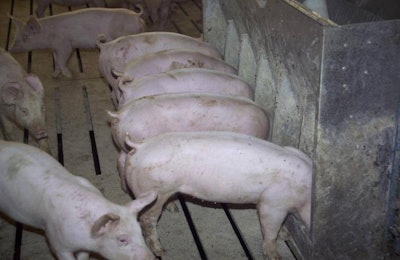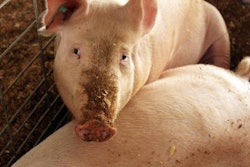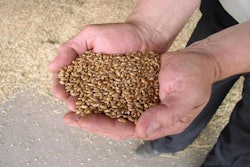
Over the past three weeks, the number of outbreaks of classical swine fever (CSF) in domestic pigs in Japan has jumped from 11 to 17. Vaccination of wild boar has begun, and new research points to a likely source of the virus in Japan.
Latest outbreak of CSF in the Japanese swine sector was in Minokamo city in Gifu prefecture at the end of March, affecting a herd of 674 animals. The virus was detected after a number of the pigs were observed to be coughing and looking unwell, according to the official report from the agriculture ministry to the World Organisation for Animal Health (OIE).
This brings the country’s official number of CSF in farmed pigs to 17 since the first cases were reported in September 2018.
In the previous two weeks, there had been five other on-farm outbreaks — one in Gifu prefecture, and four more in neighboring Aichi.
First to be confirmed was in Gifu, at a farm in Yamagata city. The CSF virus was detected on March 22 in samples taken after 17 animals of a herd of 3,637 pigs were observed to be off their feed.
In Aichi prefecture, two outbreaks were in Tahara city, with a third epidemiologically linked premises also found to be infected. In addition, for the first time, CSF was detected in Seto city in the same prefecture, with animals at two unrelated farms testing positive for the CSF virus.
Almost 18,500 pigs have been humanely destroyed as a result of these latest outbreaks alone.
By tracking and tracing pig movements and epidemiologically linked farms, the veterinary authorities have identified 24 pig units affected by the present wave of CSF, and the number of animals lost to the disease through mortality or culling now stands at more than 67,000. As well as Gifu and Aichi, the CSF virus has previously also been detected on pig farms in the prefectures of Nagano, Osaka and Shiga.
Wild boar vaccination program begins
The CSF virus continues to be detected in Japan’s wild boar population. Between March 6 and 29, the agriculture ministry reported a further 32 outbreaks in this group to the OIE. A total of 35 animals were involved in these outbreaks, one of which occurred in Aichi, while the rest were in various areas of Gifu.
Between September 2018 — when testing of wild boar began — and March 29, 240 animals out of 904 sampled in Gifu have tested positive for the CSF virus, while in Aichi, 13 out of 193 tested were positive. The virus has not been detected in any of the 259 wild boar samples from 40 other prefectures.
Wild boar are thought to be responsible for spreading CSF to Japan’s domestic pigs.
In late March, the government of Aichi began a program to vaccinate wild boar in the prefecture. According to Japan Times, this was the country’s first attempt at vaccinating wild animals. Using an oral vaccine mixed into feed bait, five more rounds of vaccination are planned in Aichi before February 2020, and a similar program is scheduled to start soon in Gifu.
Likely source of Japan’s CSF virus identified
Recently released multi-national research points to the likely source of the CSF virus in Japan being eastern or Southeast Asia.
The virus isolated from the Japanese outbreaks belongs to an emerging clade of the 2.1 subtype that has caused repeated outbreaks in that region in recent years, according to lead author Alexander Postel and others in a research letter to be published in Emerging Infectious Diseases in June.
Prior to August 2018, Japan had been free of CSF since 1992, and vaccination against the disease had been banned. These facts suggest that the causative virus was reintroduced from outside Japan, according to Postel and his co-authors.
They state that viruses of the 2.1 genotype have been linked to recent outbreaks of the disease in Asia. Through genome sequencing, the Japanese variant showed greatest similarity to two recent isolates from Beijing, China. However, the researchers add, their work cannot exclude other possible sources of the virus as not all countries in this region carry out complete gene sequencing.
For the first time, a potentially infectious form of the African swine fever virus has been detected in Japan. The agriculture ministry reports that the virus — which is unrelated to that causing CSF apart from the potentially devastating losses it can cause to members of the swine family — was found in two samples of sausage brought into the country by tourists from China in January. Previously, genetic fragments of the virus had been found in pig meat products illegally imported into Japan, but they would have been incapable of transmitting the disease.

















